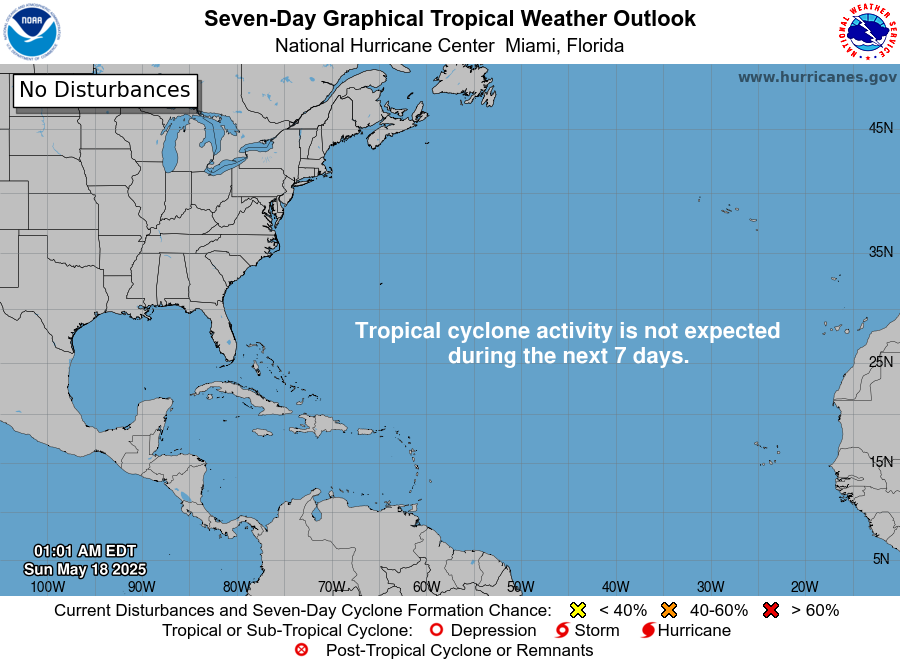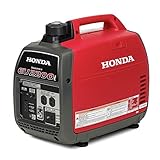The 2024 Hurricane Forecast
Meteorologists at Colorado State University predict the 2024 Atlantic hurricane season could become one of the most active on record, predicting 23 named storms — 11 of which are expected to become hurricanes.
Five of those hurricanes are forecast to be major with sustained winds exceeding 115 mph, a Category 3 storm.
The 30-year average for hurricane activity in the Atlantic is 14 named storms, seven hurricanes, and three major hurricanes.
Hurricane season begins June 1 and continues until November 30 with peak season from mid-August until October.
The reason? Changing weather patterns in the Pacific Ocean — known as a La Niña — coupled with warming Atlantic Ocean temperatures.
“These conditions will likely lead to a continuation of well above-average water temperatures in the tropical Atlantic for the peak of the 2024 Atlantic hurricane season,” the CSU researchers said. “A very warm Atlantic favors an above-average season, since a hurricane’s fuel source is warm ocean water.”
This is the 41st year that the CSU meteorologists have issued an Atlantic basin seasonal hurricane forecast.
2024 Hurricane Names
- Alberto
- Beryl
- Chris
- Debby
- Ernesto
- Francine
- Gordon
- Helene
- Isaac
- Joyce
- Leslie
- Milton
- Nadine
- Oscar
- Patty
- Rafael
- Sara
- Tony Valerie
- William
What else is new this year?
Beginning in mid-August, the National Hurricane Center will begin issuing an experimental
version of its cone graphic that includes inland tropical storm and hurricane watches
and warnings in effect.

The new graphic, which is experimental this year, is expected to provide a better forecast of inland wind risk during tropical cyclone events without complicating the traditional cone’s trajectory.
During the experiment, the Hurricane Center will continue to produce the traditional cone.
During hurricane season, FloridaRambler.com will publish both cones as part of our live storm updates at this URL: floridarambler.com/…/hurricane-season-forecast-and-checklist (Bookmark this URL for future reference)
Hurricane season preparation
It’s never too early to prepare for hurricane season when you live in Florida.
This checklist and guide addresses only your basic needs, the stuff you should have on hand when hurricane season begins on June 1, keeping in mind that early storms are very common.
And Accuweather predicts
While we don’t normally see peak season until late August-to-October, .
And it makes you think about other things
We also include links to more comprehensive guides.

The Hurricane Shelf Checklist
Every Florida resident should have a hurricane shelf in a closet or garage for recurring storm needs:
- Flashlights and battery-powered lanterns
- Fresh batteries of all sizes (Replace at least every two years)
- Weather radio with AM/FM, battery-operated or hand crank. (See recommendations below)
- First aid kit.
- Mosquito repellent.
- Tool kit includes a hatchet or axe, duct tape, hammer, nails, saw, can opener, pocket knife and a multi-tool.
- Blue tarps! Cord, rope for tie downs.
- Fire extinguisher.
- Sterno kit, restock.
- Matches in a waterproof container.
- If you still have a landline, add a corded phone to your kit.
Pre-Season Hurricane Supplies Checklist
Food and water should be replaced annually. Use it all up after hurricane season and replace over the winter. Gasoline should be used immediately after hurricane season is over and gas containers refilled with the first threat of a tropical storm this summer.
- Water: Bottled drinking water stays fresh for a year, so refresh your supply at the beginning of each season and use it up in the off-season. Don’t wait until lines form to buy it.
- Water containers: For storing tap water to bathe and flush toilets. These can be filled at the last minute, but you should already have the containers in-house.
- Gasoline: Keep your car’s tank near full all season. Buy gas containers now and, at the first hint of a hurricane, fill them up. Gas station lines are formidable the closer you get to a storm’s arrival and afterwards. After the storm threat passes, pour stored gas into your car’s gas tank. Store safely.
- Food: A pantry full of non-perishable foods, canned and packaged, is standard procedure in Florida. Stock up.
- Paper goods: Stock up on TP, paper towels, paper plates this month. There won’t be any left if you wait for the threat of a storm.
- Plastic goods: Plastic garbage bags and plastic eating utensils, plastic storage bags and heavy-duty trash bags for yard debris.
- Prescription drugs: Stay a month or two ahead on your prescriptions.
- Disinfectant: You may still have COVID supplies of disinfectants and hand sanitizers on hand. Replenish your supply for 2024.
Florida Department of Emergency Management Checklist
2022-disaster-supply-kit-checklist-final-1Hurricane Evacuation Checklist
Everybody has a different tolerance level and different needs. But whatever your threshold, you should think about it and have a plan long before you need it.
- Keep a list of local shelters. Communities often have shelters for people with special needs and shelters that allow pets. Go to the appropriate shelter.
- Have a go-bag and sleeping bag ready for each person, just in case.
- If you are leaving town, consider in advance where you will go, how to get there, and what you’ll need. If you have camping gear, have it ready to pack in your escape vehicle.
- Fill vehicle gas tanks before you even need to evacuate, and keep in mind the main roads will be crowded and out-of-town hotels already booked by smart planners.
- Wherever you are going, before you leave your house, unplug appliances and shut off electricity, shut off gas lines and your main water supply.
- If you are worried about flooding and have time, place sandbags and towels around vulnerable doorways and raise furniture and valuables off the floor. Bags of topsoil make excellent sandbags and can be spread on your lawn or your garden later.
- Don’t leave home without putting up your shutters.
- Lock the house up when you leave.
Hurricane Shelter Checklist
You may not think you’ll need to go to a shelter, but if you suddenly find “the big one” heading your way, you should have a go-bag ready for each person in your household.
Shelters don’t have much to offer, and most won’t allow pets, so identify shelters in your area that accept pets.
Every county will release it’s shelter plan on June 1 each year.
Your go-bag should contain:
- Clothing for 2-3 days
- Personal hygiene items, toothbrush, toothpaste
- Sleeping bag, air mattress, pillow
- Books and games
- Medications
- Identification (driver’s license)
- Cash
- Snacks
- Flashlight
If you decide to ride out the storm at home
- Designate a “safe room” with strong walls and least exposed to outside elements (no windows, for example.)
- Fill the bathtub(s) with water that can be used for flushing toilets.
- Unplug appliances you don’t need but leave the circuit breaker on until the house loses power. Turn it back on after power is restored.
- Keep refrigerator and freezer doors closed as much as possible. Have coolers on standby for items you use frequently to avoid opening and closing the fridge.
Nobody likes being told “what not to do,” but…
- Do not use candles or open flames inside your home. Fire-Rescue is way too busy to respond to your fire.
- Do not use generators indoors. Carbon dioxide exhaust can kill you and your family.
Do you have a generator?
- Start your generator once a month, and let it run for 5 minutes, to make sure it’s ready to go when you need it. If it doesn’t run, get it repaired soon so it’s one less thing to worry about later.
- If you forget or not diligent, at least test the generator at the start of hurricane season, keeping in mind your local small-engine shop will be overwhelmed when hurricane season heats up. Trust me, I’ve been there.
- Ethanol is OK for your car, but not small engines. Know where to buy ethanol-free gasoline for your generator. Here’s a list at pure-gas.org.
If you are camping when a storm approaches…
- Pack up and get ready to move on a moment’s notice.
- Florida State Parks and other campgrounds within the forecast cone will close, and you will have to evacuate, even if it’s several days away.
- Inland states such as Georgia and Alabama historically have opened makeshift campgrounds at fairgrounds and race tracks for evacuees to camp.
- Make sure you have enough gas to get to a place of refuge, even if you don’t expect the storm to come your way. Hurricanes can turn on a dime.
- Don’t panic, but get an early start so you’re not stuck in traffic fleeing an approaching storm.
If you have an RV in storage…
If you are storing your RV, you should ask about their policy in a storm. Some RV storage facilities will require you to remove it, but if you wait until the last minute, you will never get through on the phone. I know this from experience.
One year, I had to remove my travel trailer from storage, so I brought it home and sheltered it by wedging it between my house and my neighbor’s house. The storm missed us.
Another year, I left it in storage. A Cat 2 storm hit my house squarely, knocking out power for two weeks. The travel trailer, 25 miles away, was untouched. I brought it home after the storm passed and lived in it. I was the only one in the neighborhood with hot showers and a working stove (propane).
If you have a boat in storage…
- Ask about your storage lots policies with an approaching storm.
- If allowed, have ground anchors on hand so you can tie it down.
- If your boat damages other boats, you will likely be held responsible. Check your insurance policy for coverage.
- Some storage lots will require you to remove the boat.
If you have a boat in the water
- If you are in a marina, ask about the marina’s policies in the event of an approaching storm. Most marinas will require you to remove your vessel.
- If you are at your own dock, tie your boat securely.
- If your boat can be removed from the water, decide how and where you can store it in a storm. Sometimes that means moving the boat inland. Sometimes it means putting it in your garage or sheltering it between houses and tying it down to ground anchors.
A few picks from my own hurricane shelf
These are my suggestions for stocking your hurricane shelf based on personal experience. Florida Rambler may receive a modest commission if a purchase is made through these links. The income supports the cost of publishing this free web site.
- Flashlights and battery-powered lanterns: Coleman is our choice for affordable and reliable lanterns. An inexpensive choice is the Coleman Classic Hand-held LED Lantern ($14 on Amazon). Buy two or three.
- Fresh batteries of all sizes: We stock up on inexpensive Amazon Basics batteries at our house, allowing us to have ample supply without breaking the bank.
- Weather radio: After testing multiple radios, we settled on a battery-powered Midland ER10VP Weather Radio ($25 on Amazon) for its ease-of-use, small size, great reception and clarity of sound. We found more expensive hand-crank radios had more options but were complicated, not a good idea during an emergency. Fresh batteries!
- First aid kit: I have multiple first-aid kits for the car, kayaking, the RV and our home. At the core of is a trio of Johnson & Johnson 160-piece kits ($18 on Amazon)
- Mosquito repellent: A handheld Thermacell MR 300 ($20 on Amazon), and a twin-pack of Deep Woods Off ($20 on Amazon).
- Pocket knife: The one I carry and literally use daily is this Victorinox Swiss Army Rambler Pocket Knife ($28 on Amazon), just 2.3 inches long with a sharp blade, toothpick, tweezers, nail file, bottle opener, 2 mm flathead screwdriver and a magnetic Phillips-head screwdriver.
- Tool kit includes a hatchet or axe, duct tape, hammer, nails, saw, can opener, pocket knife, and I love this basic Leatherman Multi-tool ($50 on Amazon) to handle jobs too tough for my pocket knife
- Sterno: Keep it simple. Sterno folding stove, $12 on Amazon, and a 3-pack of Sterno canned heat, $7 on Amazon.
Consider a basic generator…
I purchased a Honda Portable Inverter Generator after Hurricane Wilma passed over my house in 2005, knocking out power for two weeks. Twenty years later, it still starts on first pull. It’s lightweight (46 lbs), quiet and fuel-efficient with enough power (2200 watts) for a refrigerator, fans, etc.
I test it frequently during the off-season to make sure it starts and doesn’t need repair. As I found out one year, the small-engine repair shops are too busy to help if you wait until the last minute.
- This popular model can operate a wide variety of appliances, making it perfect for portable use at home, camping, on the job site, or much…
- So quiet, your neighbors will thank you. The EU2200i operates at 48 to 57 dBA, which is less noise than a normal conversation. This makes it…
- Add a second EU2200i for additional power. Two identical models can be paralleled with an optional cable or cord for up to 4400 watts of…
Current Tropical Weather

Storm Updates for state and national parks in Florida
- Florida State Parks Storm Closures
- Florida State Forests Alerts and Notices
- Florida’s National Forests Alerts and Notices
- Everglades National Park Alerts and Notices
- Big Cypress National Preserve
- Canaveral National Seashore
- Dry Tortugas National Park
- Gulf Island National Seashore
- More National Parks, Preserves and Monuments
Closures for Water Management District Recreation Areas
- South Florida Water Management District
- Southwest Florida Water Management District
- St Johns River Water Management District
- Northwest Florida Water Management District
- Suwannee River Water Management District
Social Media worth following
National Hurricane Center on Facebook | Twitter
Bryan Norcross’ Tropics Updates on Facebook | Twitter
In-depth updates from the National Hurricane Center
Storm-related Forecasts for Offshore Waters

Bob Rountree is a beach bum, angler and camper who has explored Florida for decades. No adventure is complete without a scenic paddle trail or unpaved road to nowhere. Bob co-founded FloridaRambler.com with fellow journalist Bonnie Gross 14 years ago.


Onisha Ellis
Friday 5th of August 2022
I remember a camping trip one summer when a hurricane had gone up the coast and headed north. Since it was moving north my parents decided it was OK to go camping at Sebastian inlet. Back then there was no campground you just pitched a tent. I’m not sure how long we had been there if it was a day or not but we noticed that the wind was starting to pick up so my parents turned on the car and found a radio station and surprise the storm had actually turned around and was headed our way. We quickly broke down the tent packed up the car and headed back to Orlando where we lived. Growing up in Florida I experienced many storms. They’re a fact of life in Florida. Thankfully though beyond some broken limbs from trees we never had any damage. The power outages weren’t a lot of fun. It gets really hot after hurricane moves through.The 2004 hurricane season probably would’ve caused roof damage but we had replaced ours earlier in the year and it held tight and to my knowledge even though we no longer live there it’s still doing fine. Florida has a lot of new residence over the past couple of years and it’s good that you posted this . I hope they read it because you gave good information.
Bob Rountree
Saturday 6th of August 2022
Thank you, Onisha. Our primary mission is outdoor recreation, so we saw a need to keep readers up to date on tropical weather developments in Florida. When storms get close, though, we suggest readers rely on local news outlets -- radio, television and newspapers -- for more thorough reporting of local conditions.